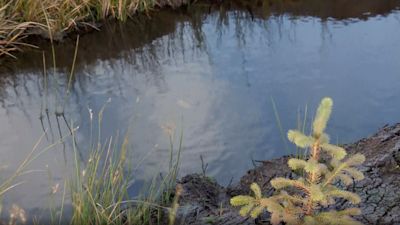£2 million wildlife project will support restoration of peat bogs in the Lakes

A £2 million habitat project has been unveiled by a wildlife charity that includes supporting a restoration of peat bogs in South Lakeland.
The Wildlife Trusts has said it will work on 12 different schemes across England and Wales to cut carbon emissions and restore habitats.
They will work alongside 46 nature charities as part of efforts to tackle the climate and nature crises.
This includes aiding Cumbria Wildlife Trust in:
Achieving its long-term vision of creating a vast nature reserve within South Lakeland
Restoring deep peat used for agriculture to lowland raised bogs
Establish sphagnum moss farming.
The Wildlife Trusts said the projects will help the UK to cut its emissions to "net zero", cutting emissions to as near to zero as possible and offsetting any remaining pollution with measures to absorb carbon.
Craig Bennett, chief executive of The Wildlife Trusts, said: "Nature can be our biggest ally in limiting global temperature rises, but we have to give it a huge helping hand.
"We need to cut emissions at source to fight climate change and we can also have a big impact by restoring nature because wilder places lock-up carbon.
"That means repairing the amazing habitats in our seas, rewetting peatlands, dramatically changing how we manage farmland, rewilding landscapes, and bringing back habitats that have been lost."
The £2 million project received its funding from the People's Postcode Lottery.
Laura Chow, head of charities at People's Postcode Lottery, said: "By helping nature thrive, these ambitious projects offer solutions to the challenges we face from climate change so these landscapes and the wildlife there can be enjoyed by future generations."
The 12 wildlife projects will look at:
Peatland repair and sphagnum moss farming in Cumbria, to create a vast nature reserve within the South Lakeland district.
Restoration of the Great North Bog - a huge peat bog across Cumbria, Yorkshire, Lancashire, Northumberland and Durham.
Creating habitat features for temperature-sensitive butterflies in Bedfordshire, Cambridgeshire and Northamptonshire.
Restoring wetlands and reintroducing beavers in Cheshire, Staffordshire and Shropshire.
Planting new woodlands in the Derwent Valley in Derbyshire.
Creating a centre at Woodah Farm in Devon working on less intensive farming.
Expanding saltmarsh restoration along the Essex coast.
Seagrass restoration in the Solent in Hampshire to increase biodiversity.
Creating a ‘nature recovery network’ in Nottinghamshire to improve soil health and water quality.
Natural flood management measures across a river catchment in Sheffield and Rotherham with the creation of woodlands and rewetting former wetlands.
Ecological surveys to kickstart peatland restoration and learning ways to monitor carbon capture in Somerset.
Working with locals to restore a lost kelp forest off the Sussex coast to provide a habitat for fish.